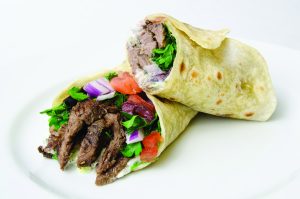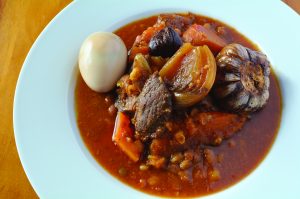×


We have detected your country as:
Please click here to go to the USA website or select another country from the dropdown list.
by: Ilse Posselt, BFP News Correspondent

Hummus and dips (Photo credit: its_al_dente/shutterstock.com)
I never expected to fall in love with Israeli food. The Promised Land, I presumed, was famous for echoes of events of times gone by, the footprints of biblical characters and locations made famous by Scripture. Tasty treats and mouthwatering meals, I reasoned, did not fit into such a mental picture. Of course, I hardly expected the people of Israel to subsist on a diet of manna and honey. I simply did not equate a country so often scrutinized under the international spotlight, so frequently drawn into conflict and so saturated in ancient history to be a culinary destination of choice.
I realized the folly of my thinking during my first days in Israel. After happily munching my way through a good number of hotel dining rooms, restaurants, street vendors and fast food outlets, I had to admit that the Land of Promise is home to a variety of the most exquisite foods I had ever eaten.
The delicious diversity of cuisine on offer in Israel, I learned, is the result of an eclectic melting pot of cultures, flavors and tastes. After nearly 2,000 years spent in exile, the Jewish people returned home from the four corners of the earth, carrying with them family recipes and cooking secrets honed through generations spent everywhere from Morocco to Mexico and Iraq to Italy. Traditional Jewish fare has its firm favorites, of course, like plump loaves of sweet challah (Shabbat bread) to be feasted on every Friday night and the fluffy dumplings and golden broth of matzoh ball soup. Yet thanks to the origin of many homecoming Jews, the food culture in Israel became a scrumptious tapestry of flavors from the Middle East, the Mediterranean, North Africa and the West.
Join me as we savor a few of Israel’s most delectable—and famous—dishes.
No ode to Israeli food will be complete without an honorable mention of the Promised Land’s most popular dip, spread and essential side to nearly every Israeli meal: hummus. Rumored to have its origins in Lebanon, this treat is a creamy mixture of crushed chickpeas, tehina (sesame seed paste), lemon, cumin and garlic. Hummus is served in an array of finger-licking ways: scooped up with hot pita bread, garnished with pine nuts and swirls of fragrant olive oil, topped with ful (fava beans) or decked with mounds of savory mince and mushrooms.

Falafal in pita (Photo credit: Brent Hofacker/shutterstock.com)
Israelis are no strangers to American takeaway fare like hamburgers and pizza. Yet eating on the go in the Jewish state often means grabbing a shawarma or falafel. Hailed as the snack of choice in the Promised Land, falafel reportedly comes from Egypt. Today, every street corner in Israel sports at least one falafel stand—with each stand owner laying claim to offering clients the world’s best falafel. Falafel is made from mashed chickpeas and a mix of exotic spices, shaped into little balls, deep fried and thrust into pita bread, nestled alongside your choice of salad, french-fries, fried eggplant and, of course, hummus.

Shawarma (Photo credit: Delirium Trigger/shutterstock.com)
Shawarma is a must for meat lovers. The streets of Israel are famous for the tantalizing smells of large slabs of roasting turkey, chicken or lamb, rotating on a spit. Served in the same way as falafel, slivers of sizzling meat are stuffed into a pita or rolled in a lafa (Iraqi flatbread) alongside mounds of salad and the other usual Israeli trimmings.
Anybody who has ever enjoyed an Israeli-style buffet breakfast will sing the praises of this culinary experience. In the Promised Land, the all-you-can-eat version of an early morning meal resembles a royal feast featuring a tempting array of cheeses, za’atar (Middle Eastern spice blend), countless fresh vegetable, fruit and fish salads, warm-from-the-oven breads and pastries, sweet treats like halva (Middle Eastern confectionary made from sesame seeds and honey) and an assortment of egg dishes.

Shakshuka (Photo credit: As Food Studio/shutterstock.com)
Despite the variety on offer, a one-pot meal called shakshuka arguably remains Israel’s favorite way to start the day. Shakshuka, which is Arabic for “all mixed up,” originally hails from North Africa, with Algeria, Tunisia and Morocco each claiming the dish as its own. The recipe is simple and rustic: two eggs poached in a gloriously spiced medley of tomatoes, onions, peppers, paprika and cumin, served in a sizzling skillet with a side of tehina and hunks of crusty white bread to mop up the rich tomatoey sauce.

Cholent (Photo credit: ChameleonsEye/shutterstock.com)
In the Jewish state, Shabbat is a special day unlike any other. It stands to reason that the extraordinary day calls for extraordinary food. A firm Shabbat favorite in any Israeli home is a dish called cholent or hamin. A hearty blend of meat, potatoes, beans, vegetables, hard boiled eggs and barley, the stew is simmered overnight and typically eaten for lunch on Saturdays.
When all you need is a bite to tide you over from one meal to the next, the Promised Land offers a selection of snacks scrumptious enough to satisfy the fancy of any foodie. Indulge in farm-fresh vegetables dipped in baba ghanoush (roasted eggplant mashed with tehina) or plump olives marinated in olive oil, lemon and chilies. For the less health conscious there are the Jewish state’s famous savory pastries, known as bourekas. Brought to Israel by Jews returning home from the Balkans and Salonika, bourekas are made from flaky, melt-in-your-mouth dough wrapped around white cheese, mashed potato, mushrooms or spinach, topped with sesame seeds and baked to golden brown perfection.
A magazine article can never do justice to the endless variety of tasty treats and mouthwatering meals the Land of Promise has to offer. The only true way to experience the deliciousness of Israeli food is to come over to taste it for yourself.
All logos and trademarks in this site are property of their respective owner. All other materials are property of Bridges for Peace. Copyright © 2024.
Website Site Design by J-Town Internet Services Ltd. - Based in Jerusalem and Serving the World.